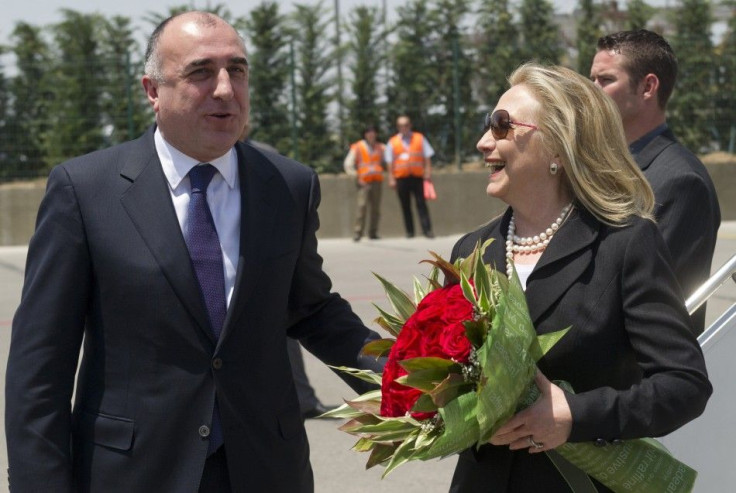Clinton Talks Peace, Democracy, Security And Oil In South Caucasus Tour

U.S. Secretary of State Hillary Clinton has arrived in Azerbaijan on the third day of her tour of the South Caucasus nations in a bid to promote peace and a pathway to democracy in the troubled region.
Clinton is scheduled to meet with Azerbaijani President Ilham Aliyev and attend an energy forum. Azerbaijan is an increasingly important oil producer and a crucial regional Western ally against Iran.
However, both sides are also expected to discuss Azerbaijan’s crumbling relations with neighboring Armenia in the wake of a series of cross-border raids that have killed a number of troops of both countries.
Muslim Azerbaijan and Christian Armenia are still technically at war, 18years after a ceasefire ended a conflict over the disputed Nagorno-Karabakh region. Between 1988 and 1994, the Azeris and Armenian conflict killed 30,000 people and displaced more than 1 million. Since the ceasefire, there have been sporadic acts of border violence.
Azerbaijan has also threatened to seize Nagorno-Karabakh (which is geographically located entirely inside Azerbaijan, but jointly patrolled by Armenian and Nagorno-Karabakh military personnel) by force.
Clinton warned Armenian officials on Monday that continued border violence could escalate and threaten to spark a broader regional war that could have dire consequences.
Prior to her arrival in Azerbaijan, Clinton visited Georgia, where she met with both President Mikheil Saakashvili in the Black Sea resort of Batumi and opposition leaders.
Clinton told the Georgian president that his state must take stronger steps toward establishing a sustainable democracy, ahead of scheduled October elections.
“You [Georgia] have taken important steps [toward democracy] since the Rose Revolution, and your progress has been noted worldwide,” she said, referring to the change of power in Georgia in November 2003 after disputed parliamentary elections that led to the resignation of President Eduard Shevardnadze and the emergence of Saakashvili.
“Now it is up to Georgia to consolidate your democratic gains. That is the key to Georgia’s future. ... The parliamentary elections this fall and the presidential election next year are an opportunity for Georgia to deepen its democracy and strengthen the legitimacy of Georgia’s democratic institutions in the eyes of your public and of the world. We urge Georgia’s leaders to ensure that it will be a competitive campaign and that elections are free and fair both on election day and in the months running up to it.”
Since the fall of the Soviet Union, Georgia has undergone two coups d’état and has never had a real functioning democracy. Despite promises by Saakashvili that he would form a true democratic nation, elections have been marred by suspicions of fraud. Opposition leaders in Georgia fear that when Saakashvili’s term ends this year, he will seek to remain in power by staying on as prime minister.
© Copyright IBTimes 2024. All rights reserved.




















